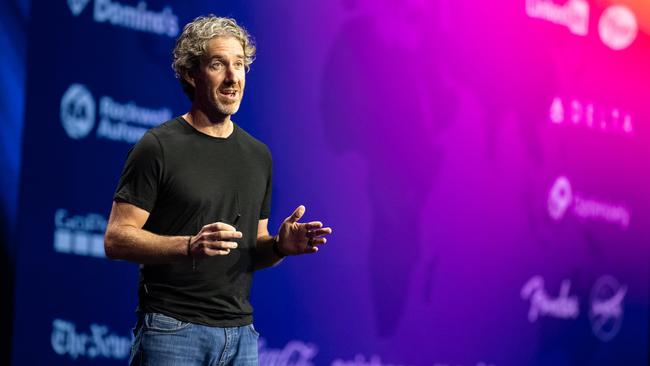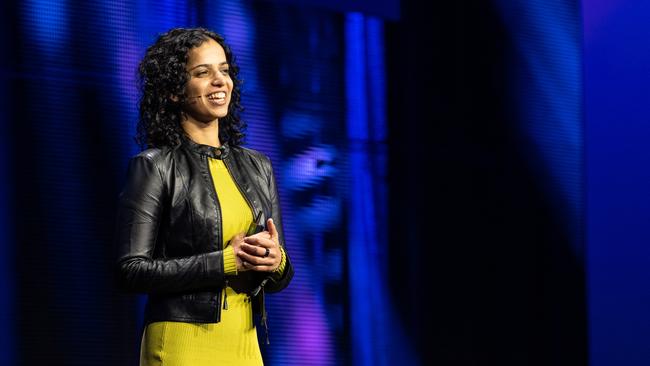Atlassian rethinking its global office footprint
The tech giant says it remains committed to building its 39-storey Sydney headquarters, but its remote work policy will have implications for its other offices.

Business
Don't miss out on the headlines from Business. Followed categories will be added to My News.
Tech giant Atlassian says it is re-evaluating its global real estate footprint as a consequence of doubling down on its Team Anywhere remote work policy, which is increasingly making the company an outlier as other firms including Salesforce, Amazon and Google begin mandating a return to the office.
Work began last year on Atlassian’s new Sydney headquarters, a 39-storey behemoth that is set to be the world’s tallest hybrid timber tower, anchoring the NSW government’s planned Tech Central precinct next to the city’s Central Station.
While work on the new HQ is progressing, the Team Anywhere policy means some 40 per cent of its workers are now located two hours or more from an Atlassian office and work fully remotely, despite a growing number of companies walking back their remote work policies initiated amid the pandemic.
Speaking in interviews at Atlassian’s Team 23 conference in Las Vegas, in which the company made several AI and product announcements, executives said they were committed to the Team Anywhere policy but that it would require a real estate rethink including the potential closure or reduction of some offices.
Atlassian is domiciled in Delaware but has offices in Sydney, San Francisco, Austin, Boston, New York, Bengaluru, Yokohama and Amsterdam among others.
“We are re-evaluating our real estate,” Atlassian co-founder Scott Farquhar said on the sidelines of the Team 23 summit. “We do have a big footprint because we have offices around the world. We’re continuing to build the tower in Sydney, and we’re super excited by that, but in terms of working out the amount of space we want and how much to carry, we have a team looking at their utilisation level, the cost per visit, and what percentage of people within a two-hour catchment area turn up.

“In some cases that has led to us shutting offices, because a satellite office that had 15 people but on average had less than one person a day, it’s like ‘OK, let’s just go to a pub or rent an conference room or a WeWork’, and it’s cheaper to do that.”
Mr Farquhar said plans for the Sydney HQ were on track. The $546m skyscraper is set to be completed by 2026.
“Nothing’s changed at this stage,” he said. “When we looked at our growth rates, we thought we had X number of years until we’d fill it up, and then we’d have to find extra space nearby. The great thing about Team Anywhere is that the number of years we can use [the tower] without needing to overflow to another space is actually extended.”
Atlassian last month laid off 500 workers – about 5 per cent of its workforce – but says it is continuing to hire and build its technical teams, and overall headcount. The company said the layoffs were not a reflection of its own financial performance
The tech industry’s share of leasing activity dropped last year in the US, according to data from commercial real estate firm CBRE, accounting for 17 per cent of office leases compared with 21 per cent a year earlier.

The executive who helped develop the Team Anywhere policy, Anu Bharadwaj, who now serves as Atlassian president, said the early shift to distributed work was an example of the company’s “maverick” nature.
“We took a contrarian approach in February 2020 when we said that instead of mandating workers come in four days or three days, let’s go the other direction. And we were seeing data that fully distributed teams were very productive. We went the whole hog, and it’s been incredibly successful for us,” Ms Bharadwaj said.
“Now that the pandemic seems to be largely over our belief is very much that the genie is out of the bottle and we’re not going back to the old world. When we talk to our customers, some of them have been saying ‘how do you lure your employees back to the office?’ and my answer is we do exactly the opposite of it.’”
Ms Bharadwaj, a former Microsoft executive who previously served as Atlassian’s chief operating officer, said when employees come together for “intentional gathering events” they’re required to spend at least 50 per cent of time on social activities – not work – to build trust and mutual understanding.
“The exec team initially had a guideline not to go into the office for more than one hour a week, because it would implicitly put pressure on our team, if they see us sitting in the office all the time,” she said.
“This has definitely been successful for us and we’ve been able to recruit people that we wouldn’t otherwise have been able to recruit.”
David Swan travelled to Las Vegas as a guest of Atlassian.
Originally published as Atlassian rethinking its global office footprint





